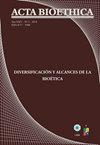Body privacy in gynecology obstetrics
IF 0.3
4区 哲学
Q4 ETHICS
引用次数: 1
Abstract
This study aimed to develop a scale to ethically evaluate the privacy of the body in gynecology and obstetrics. It was carried out in a university research and application hospital and in a private hospital in Turkey. A stratified sample was adopted with a total of 2,159 participants, including physicians, nurses, and midwives, OB/GYN patients, surgical patients, internal medicine patients, and healthy individuals. The Lawshe method was used. The results showed that physical space is important in protecting privacy; the participants perceived privacy as a right; women, married people, primary school graduates, older people and those closest to rural culture are more sensitive to privacy than others; Among healthcare providers, physicians are more privacy conscious than nurses and midwives; no participant had in-depth knowledge of patient rights and relevant legislation. The body privacy scale in gynecology and obstetrics proved to be a valid and reliable scale. With it, the privacy of the body in obstetrics and gynecology can be evaluated in future research, as well as the perceptions of body privacy of those who receive and provide medical care. By applying this scale, the privacy of gynecological and obstetric patients can be protected and the results reflected in clinical practice. This scale can also be used in education and in improving ethical sensitivity in physicians.妇产科的身体隐私
本研究旨在开发一种从伦理角度评估妇产科身体隐私的量表。它是在土耳其的一所大学研究和应用医院以及一家私立医院进行的。采用分层样本,共有2159名参与者,包括医生、护士和助产士、妇产科患者、外科患者、内科患者和健康人。使用了Lawshe方法。结果表明,物理空间在保护隐私方面具有重要意义;参与者将隐私视为一项权利;女性、已婚人士、小学毕业生、老年人和最接近农村文化的人对隐私比其他人更敏感;在医疗保健提供者中,医生比护士和助产士更注重隐私;没有参与者对患者权利和相关立法有深入了解。妇产科身体隐私量表是一种有效、可靠的量表。有了它,可以在未来的研究中评估妇产科的身体隐私,以及接受和提供医疗护理的人对身体隐私的看法。通过应用该量表,可以保护妇科和产科患者的隐私,并将结果反映在临床实践中。这个量表也可以用于教育和提高医生的道德敏感性。
本文章由计算机程序翻译,如有差异,请以英文原文为准。
求助全文
约1分钟内获得全文
求助全文
来源期刊

Acta Bioethica
Bioethical Issues-
CiteScore
0.40
自引率
0.00%
发文量
22
审稿时长
12 weeks
期刊介绍:
Acta Bioethica is a biannual publication by the Interdisciplinary Center for Studies in Bioethics of the University of Chile (ISSN 0717-5906, press edition, y 1726-569-X, electronic edition), which publishes in three languages: Spanish, English and Portuguese.
Indexed in Science Citation Index (SCI), Scopus, Lilacs, SciELO y Latindex, and in database from several Institutions; it constitutes a pluralistic source of perspectives and an important tribune which accepts the contributions of authors compromised with the interdisciplinary study of ethical determinants and consequences of techno scientific research.
 求助内容:
求助内容: 应助结果提醒方式:
应助结果提醒方式:


